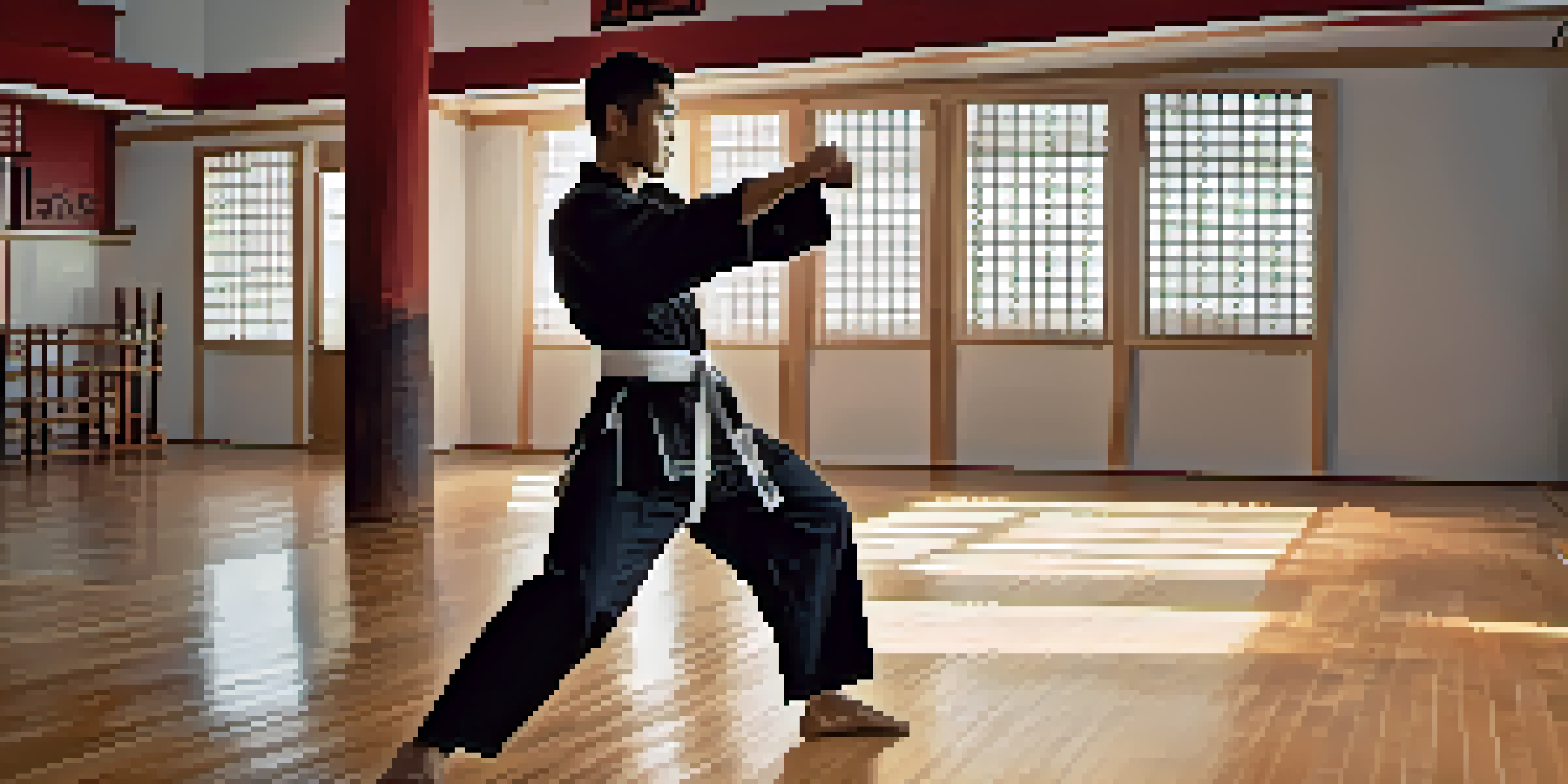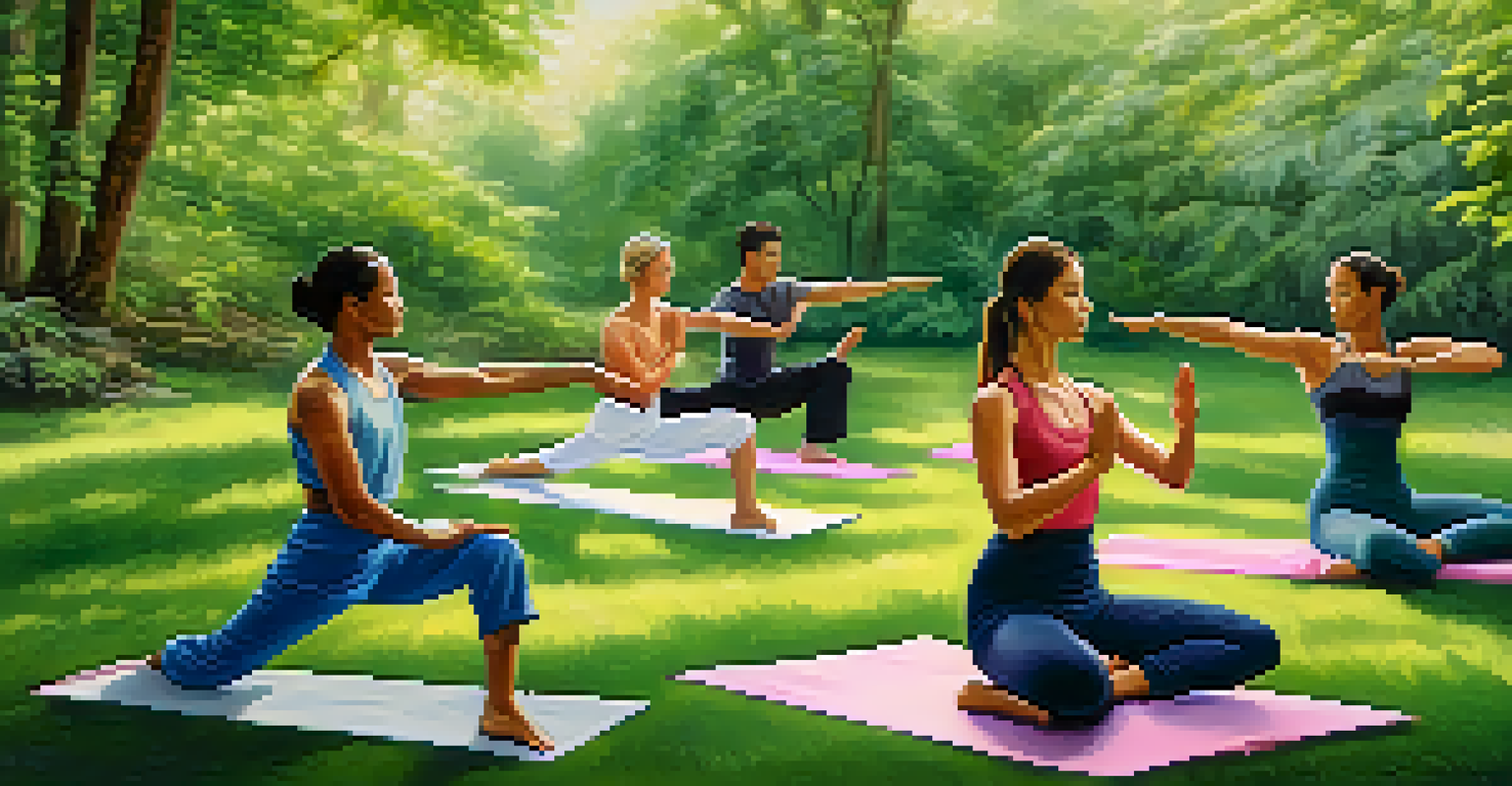Yoga and Martial Arts: A Dual Approach to Rehab

Understanding Yoga: A Holistic Healing Practice
Yoga is more than just physical exercise; it’s a holistic practice that integrates mind, body, and spirit. Originating from ancient India, yoga includes postures, breathing techniques, and meditation, all designed to promote overall well-being. For those recovering from injuries, yoga can enhance flexibility, strength, and balance, which are essential for rehabilitation. Moreover, the mindful nature of yoga helps reduce stress and anxiety, creating a calm environment for healing.
Yoga is the journey of the self, through the self, to the self.
Imagine a tree swaying gently in the wind; that’s the flexibility yoga can bring to your body. As you stretch and hold various poses, you not only improve your physical state but also cultivate mental resilience. This dual benefit makes yoga an ideal starting point for anyone looking to recover from physical setbacks, as it encourages a gentle yet effective approach to rebuilding strength.
Additionally, yoga can be tailored to individual needs, making it accessible for everyone. Whether you’re recovering from a sports injury or managing chronic pain, there’s likely a specific yoga practice that can support your journey. By focusing on breath control and mindfulness, yoga helps you reconnect with your body, fostering a deeper understanding of your physical capabilities.
Martial Arts: Building Strength and Discipline
Martial arts encompass a variety of disciplines that not only focus on physical techniques but also emphasize mental fortitude and discipline. Whether it’s karate, judo, or taekwondo, each martial art offers unique movements that enhance strength, coordination, and agility. For rehabilitation, these practices can be particularly beneficial as they promote functional movement patterns, which are critical for recovery.

Think of martial arts like a well-choreographed dance, where each move is purposeful and precise. This precision helps in developing muscle memory, which is vital when you’re relearning movements after an injury. Moreover, the structured nature of martial arts training instills a sense of routine and commitment, encouraging individuals to stay engaged in their rehabilitation process.
Yoga Enhances Holistic Healing
Yoga integrates mind, body, and spirit, promoting overall well-being and aiding in injury recovery.
Furthermore, martial arts teach valuable self-defense skills, providing not just physical benefits but also boosting confidence. As you progress in your practice, you’ll find that both your physical abilities and self-esteem grow. This holistic approach to rehabilitation is profound, as it builds not just a stronger body but also a more resilient mindset.
The Synergy of Yoga and Martial Arts
Combining yoga and martial arts creates a unique synergy that enhances the rehabilitation experience. While yoga focuses on flexibility and mindfulness, martial arts brings strength and discipline to the table. Together, they offer a comprehensive approach to recovery, ensuring that both mental and physical aspects are addressed.
The ultimate aim of martial arts is not having to use them.
Imagine a well-balanced meal that nourishes your body from all angles; that’s what this combination offers. The dynamic movements of martial arts can improve strength and endurance, while yoga’s calming techniques help in recovery and stress relief. This blend ensures that individuals not only heal faster but also emerge stronger and more centered.
Moreover, integrating these two practices can keep rehabilitation enjoyable and engaging. By mixing up routines, individuals are less likely to experience burnout or frustration. This variety not only fosters a positive mindset but also encourages continuous progress on the path to recovery.
Mindfulness and Recovery: A Key Connection
Mindfulness plays a crucial role in both yoga and martial arts, serving as a foundation for effective rehabilitation. By focusing on the present moment, individuals can cultivate awareness of their bodies and emotions, which is essential during recovery. This practice helps in recognizing physical limitations and encourages a compassionate approach to healing.
Picture yourself standing on a serene beach, feeling the sand beneath your feet; that’s the essence of mindfulness. Incorporating mindfulness into your rehabilitation routine allows you to listen to your body, making adjustments as needed. This self-awareness can prevent overexertion and promote a healthier recovery journey.
Martial Arts Build Strength and Focus
Martial arts improve physical techniques and mental discipline, essential for effective rehabilitation.
Additionally, mindfulness techniques can be beneficial in managing pain and anxiety, common challenges during rehabilitation. By training the mind to stay present, individuals can reduce negative thought patterns and embrace a more positive outlook on their recovery process. This mental shift can significantly impact overall well-being.
Creating a Balanced Routine: Tips for Integration
Establishing a balanced routine that incorporates both yoga and martial arts can be a game-changer in rehabilitation. Start by assessing your current fitness level and identifying specific goals you wish to achieve. This foundational step will guide you in selecting appropriate practices from both disciplines that align with your recovery needs.
Consider a weekly schedule where you alternate between yoga and martial arts sessions. For instance, you might dedicate two days to yoga for flexibility and mindfulness, followed by martial arts classes that focus on strength and coordination. This variety not only keeps things interesting but also ensures a well-rounded approach to your rehabilitation.
Remember to listen to your body throughout this process. It’s important to adjust the intensity and duration of each practice according to your comfort and energy levels. A gradual approach will not only prevent injuries but also allow for steady progress, making your rehabilitation journey more sustainable and enjoyable.
Success Stories: Real-Life Examples of Healing
Many individuals have experienced transformative results by combining yoga and martial arts in their rehabilitation journey. For example, athletes recovering from injuries have reported improved mobility and strength through this dual approach. One runner shared how incorporating yoga helped her regain flexibility after a knee injury, while martial arts training rebuilt her confidence and stamina.
Another inspiring story comes from a martial artist who faced a significant shoulder injury. By integrating yoga into his recovery routine, he was able to enhance his range of motion and reduce pain. This holistic approach not only allowed him to return to the mat but also deepened his appreciation for both practices.
Combining Practices for Better Recovery
Integrating yoga and martial arts offers a comprehensive approach to rehabilitation, addressing both physical and mental health.
These success stories highlight the power of combining yoga and martial arts, showcasing how individuals can find healing and strength through diverse methods. Such examples serve as motivation for others on similar paths, reinforcing the idea that rehabilitation doesn’t have to be a solitary journey; it can be a vibrant and enriching experience.
The Future of Rehabilitation: Embracing Holistic Practices
As the field of rehabilitation continues to evolve, there’s a growing recognition of holistic practices like yoga and martial arts. Healthcare professionals are increasingly incorporating these methods into rehabilitation programs, acknowledging their benefits for both physical and mental health. This shift towards a more integrated approach is paving the way for individuals to experience a more comprehensive healing journey.
Imagine a future where rehabilitation is not just about physical recovery, but also about nurturing the mind and spirit. This vision is becoming a reality as more practitioners embrace the idea that emotional well-being is crucial for effective healing. By prioritizing holistic practices, we can create a more supportive environment for those on the road to recovery.

Ultimately, embracing yoga and martial arts as complementary tools in rehabilitation can lead to more successful outcomes. This dual approach fosters a sense of community, resilience, and empowerment among individuals, encouraging them to take charge of their healing journeys. Together, these practices can inspire a new era of rehabilitation that celebrates the interconnectedness of body, mind, and spirit.